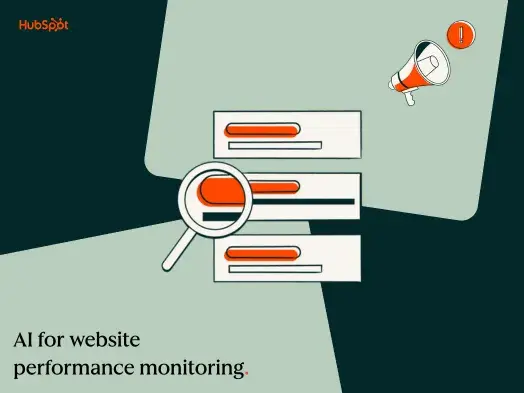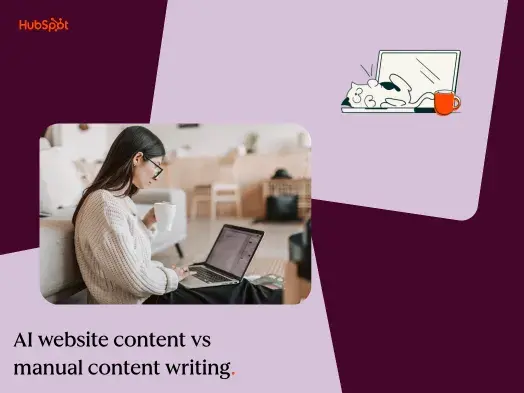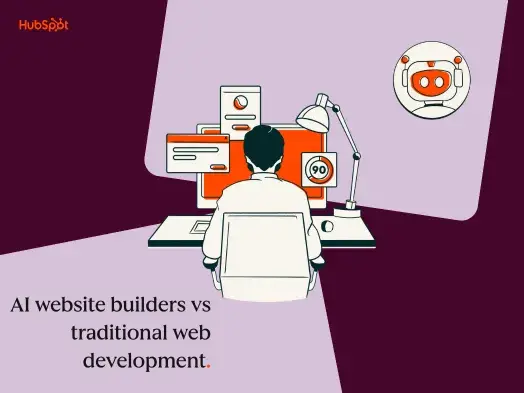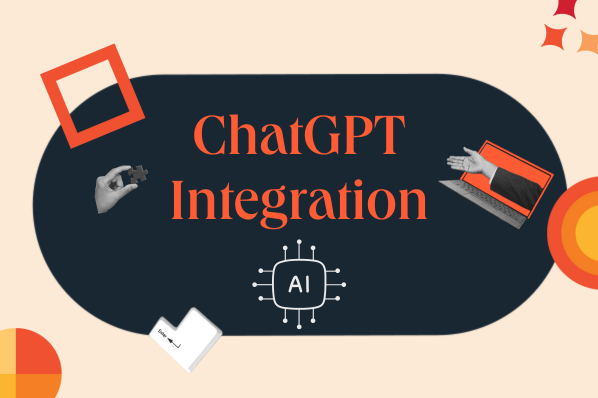It used to be that if you wanted a website but didn’t have a designer or developer, you’d have to comb through countless premade templates and hope you found one you liked. Thanks to AI website builders, that’s no longer the case. You can simply describe your idea in plain text to the AI, and it’ll generate a working website in seconds — or so, that’s the promise.
AI website builders automate design and development by using artificial intelligence to understand your prompts and generate a website based on them. But are they all that they’re cracked up to be? I decided to find out.
I spent hours testing 15 AI website generators, evaluating them based on AI capabilities, ease of use, and design quality. I then curated a list of the five best AI website builders for specific use cases. So whether you’re a solopreneur, an ecommerce business, or just looking for a truly free AI website builder, you’ll find something valuable in the list below.
Table of Contents
- AI Website Builder Summary
- How AI Website Builders Work
- Pros and Cons of AI Website Builders
- Key Features to Look for in AI Website Builders
- Quick Comparison: Best AI Website Builder for Your Needs
- The Best AI Website Builders
- AI Website Builder FAQs
AI Website Builder Summary
AI website builders generate a website based on the description you provide. They make it easy for non-technical people to build and launch websites fast, without needing to know how to code. AI website builders often have tools such as drag-and-drop website editors, AI text and image generation, and AI assistants to make the process even easier.
However, use AI website builders with caution. If you’re using one that generates code, this needs to be reviewed by a developer for bugs and security vulnerabilities. Additionally, the content on AI-generated sites needs to be reviewed and customized based on your business, as much of the text and images will not be relevant or usable as is.
Experiment with HubSpot’s free AI website builder to automate the website creation process on a platform that has native sales and marketing tools to grow your business.
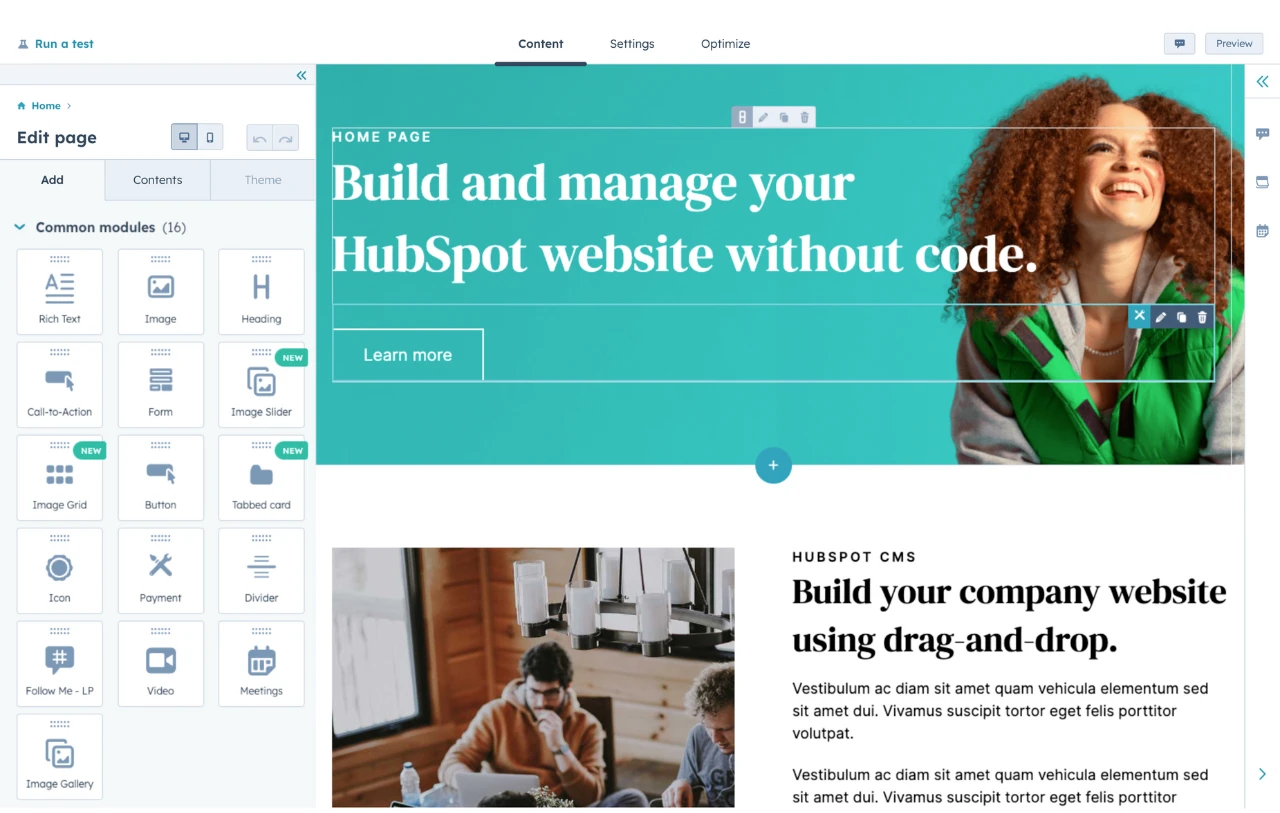
HubSpot's Free Website Builder
Create and customize your own business website with an easy drag-and-drop website builder.
- Build a website without any coding skills.
- Pre-built themes and templates.
- Built-in marketing tools and features.
- And more!
How AI Website Builders Work
What do we mean when we say “AI website builder”?
First, let’s clarify what we mean by “AI website builder.” That is a very broad term, but I ran into basically two categories of it during my research:
- All-in-one website platform (no-code). This category bundles a website builder + CMS + web host, and has AI features (like AI image and text generation). Examples would be Wix and Squarespace, which are no-code website builders and CMSs that now have AI website builders too. These have visual website editors, where you can easily change text, insert images, and rearrange sections without using code. These types of tools are aimed more at marketers and non-technical business owners who want to quickly launch a site without knowing how to code.
- Code-generating AI web app builder. Also known as a “vibe coding” tool, this category generates code that you can review, edit, and export, but it has no CMS. Examples of this would be Lovable and Bolt. These AI website builders are more properly termed AI web app builders — they can create simple websites, but are built for much more complex web applications. Additionally, they’re more aimed at developers because they generate code in a separate panel that the developer can then review, edit, and export to deploy on a separate platform.
I tested a lot of the latter tools, including Lovable, Hostinger Horizons, and Bolt. I enjoyed using them because they created custom websites in minutes that were visually appealing. But at the end of the day, I realized that, for most people reading this blog post, you don’t need code-generating tools.
While Bolt and Lovable now have built-in hosting and have introduced visual editors, they don’t have built-in content management systems (CMSs), so unless you know how to code or you’re okay with chatting with the AI when you need to make an update (like publish a new blog post) — it could be a headache for a non-technical user to maintain.
So, I ended up curating a list of the best AI website builders that are more accessible to marketers. They do use generative AI to generate a website for you, but they’re not the web app builders that go overboard and generate code for you to edit.
How to Use an AI Website Builder in 3 Steps
Here’s a three-step breakdown of how AI website builders work.
Step 1: Describe the website you want, and wait for the AI to generate it.
AI website builders generate websites based on the information you give them. But there are two distinct ways they might collect that information:
- Option 1: Text-based prompts, where you type a description of your site into a text box. It’s kind of like an open-ended answer on a test.

- Option 2: Guided preset prompts, where you select from predefined options. It’s kind of like a multiple-choice answer on a test.

Some AI website builders, such as HubSpot’s (shown above), use a combination of both.
After you input the prompts, AI will generate the site in seconds to minutes.
Step 2: Edit the AI-generated website in a no-code editor.
Once the AI has generated the website, view it as a first draft — not a final product. You then need to review it. Think of the text and images as placeholders. Most likely, you’ll replace the images entirely with your own images, especially if you’re selling physical products.
AI website builders usually have features that make AI website creation easier. For example, they’ll likely have:
- No-code website editors, in which you can often drag and drop elements that you want, or rearrange them.
- AI text generation that can either create new text or refine existing text.
- AI image generation that can create images based on prompts. Use these with caution, as I found they still have a long way to go, and they can’t generate exact replicas of your actual physical products. So, again, I see them as placeholders.
- AI assistants that are chatbots that you can ask questions of if you get confused while editing or run into issues.
Step 3: Click to launch.
The AI website builders I included in this article require one click to publish your site publicly. That’s because they all have native hosting solutions (most of them are web hosting sites that started offering AI website builders). That makes it so easy for non-technical people to launch sites, without needing a developer to deploy the code.
If you have already purchased a custom domain, you then connect it the website builder so that when someone types your domain name, they can find your new site. If you haven’t yet purchased your custom domain, you’ll need to first buy one from a domain registrar.
Pros and Cons of AI Website Builders
Pros
- Fast. AI website builders generate websites fast (often, in fewer than three minutes). Type a description of your website or answer some questions, and the AI will generate the site for you.
- Low barrier to entry. They enable non-developers to build the site they imagine. Instead of building a website with code, you can build one with your words. Some AI website builders even generate code in a separate tab, which you can review, edit, and export.
- Instant answers. AI assistants can help you troubleshoot. Type questions in the chat and receive instant answers.
Cons
- Potential challenges to updating. If you use an AI website builder that’s more of a code generator/web app builder, then unless you’re a developer, every time you want to update your site (add a new blog post or change a page headline), you might have to chat with the AI and ask it to do it for you.
- Generic designs. The AI-generated designs often aren’t as good as the provided premade templates. There are thousands of website templates already out there on the internet, and these are often created by professional web designers and developers, have been reviewed and tested by professionals, and have been reviewed by customers too. I have built an entire online career thanks to website templates and traditional website builders, and I will likely stick to them. AI, to me, is best used as an assistant — but not to completely generate a site.
- Unusable AI-generated images. Even if the tool has an AI image generator, you’re probably still going to need to provide your own images. Think about it: You could have AI generate product images of your handmade bath soaps, but the AI doesn’t actually know what your product looks like, so it’s just guessing. Then, your customers are going to be disappointed when they receive a product that doesn’t look like the photos. AI-generated images are more like placeholders for you while you get professional product photos.

HubSpot's Free Website Builder
Create and customize your own business website with an easy drag-and-drop website builder.
- Build a website without any coding skills.
- Pre-built themes and templates.
- Built-in marketing tools and features.
- And more!
Key Features to Look for in AI Website Builders
Here are the criteria and AI website builder features I evaluated when curating this list.
- AI website generation capability. Is the AI truly “smart”? Did it understand my text prompt?
- Design quality. Does the AI-generated site actually look good?
- AI image generation. Are the AI-generated or AI-selected images relevant and usable?
- Deployability. How easy is it to launch the site? This will mean different things for different audiences, so I’ve looked at it from a marketer’s point of view. Marketers (and non-technical folks) will care more about one-click publication on the same platform, while devs might care more about how easy it is to export code to deploy on a different platform.
- Ease of updating. How easy is it to maintain/update the site?
- Ecommerce features. Will the site be able to sell products or services? For example, a true online store will need an add-to-cart button, a shopping cart, payment methods, and account dashboards for users to create an account and view order history. However, not every site needs ecommerce (for example, a writer’s portfolio site probably doesn’t), so I kept that in mind too.
- Integrations. Can I easily connect my other tools to the site? For example, marketing integrations are crucial if you want to grow your site’s traffic and revenue after launch. AI SEO tools might also be useful for you, especially if you're new to search engine optimization.
- Pricing. Is there a free trial? What about a free plan, and how far could I get with that? Do I get a lot of “bang for my buck” on the paid plans?
Quick Comparison: Best AI Website Builder for Your Needs
|
AI Website Builder |
Best For |
Free Plan or Trial? |
Pricing |
Key AI Features |
|
HubSpot |
Businesses serious about scaling with built-in marketing and sales tools |
Yes. The AI website builder is completely free. |
Free. Paid plans start at $9/mo/seat, billed annually. |
Breeze Assistant, blog writer, image generator, translation, content remix |
|
Shopify |
Building a trusted ecommerce website with robust online shopping features |
Yes. Offers a three-day free trial. |
Paid plans start at $29/mo, billed annually. |
Sidekick AI assistant, image editing, text generation |
|
Wix |
Beginners who want AI to guide them through the website creation process |
Yes. Free plan available. |
Includes a free plan. Paid plans start at $17/mo, billed annually. |
Astro AI assistant, Theme Assistant, AI Marketing Agent, AI Custom Agent, image generation, text generation and editing |
|
Squarespace |
Creative businesses that value clean, sophisticated design and ecommerce features |
Yes. Offers a free 14-day trial. |
Paid plans start at $16/mo, billed annually. |
SEO Tools, Product Composer, blog posts |
|
Solo (from Mozilla) |
Simple single-page portfolio sites for solopreneurs |
Yes. Solo is free to use and does not currently offer paid plans. |
Completely free to use |
Just the AI-powered website generator |
The Best AI Website Builders
To write this article, I tried 15 different AI website builders (both no-code and code-generating types). For every AI website builder, I generated two different types of websites using the exact same prompts, so I could standardize the experiment by using the same “measuring stick.” Below are the prompts I used:
Simple portfolio prompt:
“Create a portfolio site for Jane Doe's freelance writing business. Include a homepage, about, contact, and services page. Brand colors are teal, gold, and white. Brand personality is friendly and professional.”
Ecommerce website prompt:
“We are a business that sells smocks (which are like aprons) to artists, gardeners, and cooks. The name of the business is HubSmocks. Make an ecommerce website that has a homepage, product listing pages, shopping cart, a checkout page, order confirmation, order tracking, account signup, account dashboard. Our brand colors are Forest Green (#2D5016), Rich Brown (#6B4423), Deep Teal (#008B8B). Our brand personality is down-to-earth and friendly. The goal of the site is to sell our physical products.”
I’ll even show you the websites these AI builders generated, but keep in mind:
- These websites are the first AI drafts — I did not edit them. With some editing, they’d look much better. But I wanted to show you what the AI was capable of on its own.
- Some website builders aren’t specifically designed for ecommerce. For instance, Solo is an AI website builder for simple solopreneur websites, so I didn’t include an ecommerce site example for that one.
Now, let’s dive into my reviews of the five best AI website builders I found.
1. HubSpot: Best Free AI Website Builder for Business Growth

First, HubSpot’s AI website builder will ask you to describe your business. This is where you can type your prompt. Next, it will have you select your website goals. After that, within 20 seconds, it’ll create a website.
Best for: Businesses serious about scaling with built-in marketing and sales tools
Key AI Features:
Breeze is the name of HubSpot’s suite of AI tools, which includes:
- AI website generator: Type a prompt and answer questions to get the AI to generate a site. The AI is pretty smart in that it understood my prompt. I played with different ones, and if I, for example, said that I was a restaurant writer, it changed the text to reflect that.
- Breeze Assistant: An AI assistant you can chat with and get answers to questions if you run into issues while building your site. For example, ask it how to add a logo to your website.
- AI blog writer (beta) is available on Content Hub Professional and Enterprise plans.
- AI image generator is available on paid plans.
- AI translation is available on Content Hub Professional and Enterprise plans.
- Content remix lets you turn one piece of content into multiple assets. Available on Content Hub Professional and Enterprise plans.
Pros:
- One-click publication to take your site live
- Free HubSpot-branded subdomain. (Example format: 12345678.hs-sites-na2.com)
- HubSpot is one of the only website builders I could find that lets you connect a custom domain for free (without upgrading to a paid plan). But since HubSpot isn’t a domain registrar, you must buy a domain elsewhere and then connect it to HubSpot.
- Drag-and-drop, no-code editor makes it easy to make changes to your site.
- Extensive suite of sales and marketing tools baked right into your account, including a meeting scheduler, email marketing, and A/B testing (but you must upgrade to a paid plan to access A/B testing).
- With a built-in free CRM, anyone who submits a form automatically gets added to your contacts for easy tracking and relationship management.
Cons:
- The AI website builder can only generate a single-page site. (Bonus: This makes it great for building a landing page!)
- While the AI website generator is free to use, you'll need to upgrade to a premium plan to access other AI tools, including the image generator.
- To access the most advanced sales and marketing tools, you need to upgrade to a paid plan.
- While it does have HubSpot Payments, it doesn’t have native ecommerce features that a true online store would need, such as a shopping cart.
Pricing: HubSpot’s AI website builder is completely free to use. It’s part of the broader HubSpot customer platform, much of which is also free to use. For more advanced features, HubSpot offers paid plans.
Below are the plans for Content Hub, the content marketing software under which the AI website builder falls.
- Free. Up to two users, up to 30 website pages with HubSpot branding, up to 30 landing pages with HubSpot branding, connect a custom domain.
- Content Hub Starter ($9/mo/seat, billed annually). 500 HubSpot Credits (which power the AI tools). Removes HubSpot branding, up to 30 website pages, up to 30 landing pages, AI image generator, AI assistants, HubSpot payments.
- Content Hub Professional ($450/mo, billed annually. Includes 3 core seats). 3,000 HubSpot Credits. Up to 10K website pages, up to 10K landing pages, video hosting and management, A/B testing, Breeze Customer Agent, AI translation, single sign-on (SSO), case studies (beta), custom reporting, memberships.
- Content Hub Enterprise ($1,500/mo. Includes 5 core seats). 5,000 HubSpot Credits. Activity logging, multisites, content approvals, custom objects, sensitive data functionality.
HubSpot’s AI-Generated Portfolio Site

2. Shopify: Best AI Website Builder for Ecommerce

If you’re building an ecommerce site, why wouldn’t you build it using the most popular ecommerce technologies around? Shopify is well-established, well-respected, and extremely capable of hosting your online store.
I had high hopes for Shopify, since I used its AI website builder a few months ago to build an ecommerce site for a fictional eco-friendly furniture company. It did a great job back then. But this time, its AI wasn’t so smart — it wasn’t able to produce relevant images for my smocks. This wasn’t a huge deal for me because if this were a real shop, I would’ve uploaded real photos of my products anyway.
Also, compared to others on this list, Shopify’s prompts are very limited (only 200 characters allowed), and Shopify’s AI did not seem able to understand prompting around colors and brand personality.

HubSpot's Free Website Builder
Create and customize your own business website with an easy drag-and-drop website builder.
- Build a website without any coding skills.
- Pre-built themes and templates.
- Built-in marketing tools and features.
- And more!
Best for: Building a trusted ecommerce website with robust online shopping features
Key AI Features:
Shopify Magic is the name of Shopify’s suite of AI tools, which includes:
- AI website builder: Answer a few onboarding questions, then type a 200-character prompt to generate a theme. The AI understood the context of my prompt and generated a site with relevant photos and text some of the time. Sometimes, it could not find relevant photos.
- Sidekick AI assistant, which can help you if you run into issues setting up your site.
- AI image editing, which includes removing background
- AI text generation, which can create headlines and product descriptions.
Pros:
- As a leading ecommerce platform, Shopify has native features for a shopping cart, checkout page, and account dashboard to show orders.
- One-click publication to take your site live — but you must upgrade to a paid plan first. Otherwise, you can only publish a password-protected website.
- No-code editor makes it easy to make changes to your site
- Option to select from high-quality stock images
Cons:
- Shopify’s free trial is only three days long, the shortest of the free trials on this list.
- To launch your site to the public, you must upgrade to a paid plan. Shopify will let you publish your site as a password-protected site during your trial period.
Pricing: Shopify pricing includes four paid plans, starting at $29/mo, billed yearly. It offers a three-day free trial.
Shopify’s AI-Generated Portfolio Site

Shopify’s AI-Generated Ecommerce Site

3. Wix: Best AI Website Builder for Beginners

There’s a reason the HubSpot Blog frequently selects Wix as the best AI website builder — it’s affordable, feature-rich, and easy to use. However, I still personally believe that Wix’s 2,000+ designer-made website templates are much more beautiful than anything the AI has created for me. (And I’ve tested Wix’s AI builder many, many times).
Best for: Beginners who want AI to guide them through the website creation process
Key AI Features:
- Wix AI website builder is a chat-based experience where the AI asks you multiple questions, and you can type your responses.

- Astro AI assistant can answer questions in your dashboard. For example, I asked it how to add customer reviews to my site, and it suggested some third-party apps. However, in this case, I found that Googling the same questions was faster and produced better results (it led me to a Wix help page that showed me how to install the Wix Reviews app.)
- Theme Assistant can redesign your site's theme and guide you through the website creation process. When I tried Theme Assistant (Beta), we had multiple false starts, where I asked it to do something like help me create a hero image slider, and it told me it could not. However, I found a helpful use case: I told Theme Assistant I wanted to change all buttons to red, and it suggested the exact shade of red that would work well with my theme (brick red #8F1402) and even opened the color panel for me so I could easily insert the color.
- AI Marketing Agent reviews business goals and creates a marketing strategy.
- AI Custom Agent can be personalized for whatever goals you want to accomplish (for example, engaging inactive customers).
- Wix also has AI-suggested business names and tagline suggestions, AI image generation, and AI text generation and editing.
Pros:
- One-click publication to take your site live. You do not need to upgrade to a paid plan to publish your site. You can launch your site for free with Wix branding on the site and a Wix-branded subdomain (you cannot customize that free branded subdomain).
- Access to free Wix images and videos, vector art, and illustrations, as well as Shutterstock images and videos
- Extensive marketing suite, including lead-capture forms, Google Ads with Wix, customer accounts
- Payment tools, including plans/recurring payments and automated sales tax
- Full ecommerce platform, including a product catalog, abandoned cart recovery, automatic discounts, product reviews, and pre-order acceptance
- Drag-and-drop, no-code editor to make changes to your site
- Paid plans include a custom domain registration that’s free for the first year
Cons:
- You have to upgrade to a paid plan to connect a custom domain.
- The AI-generated website designs, to me, are not as good-looking as the Wix templates.
- You can't change your Wix template on the same site. If you want to change your Wix template later, you must create a new site and then transfer content over to it. This baffled me when I found out, because most of the other platforms on this list (HubSpot, Shopify, and Squarespace) let you change the template of your site.
Pricing: Wix’s pricing includes a free plan, with paid plans starting at $17/mo.
Wix’s AI-Generated Portfolio Site

Wix’s AI-Generated Ecommerce Site

4. Squarespace: Best AI Website Builder for Design Quality

Even as a longtime WordPress fangirl, I chose to move my freelance writing website to Squarespace back in 2022 (pre-AI website builder) due to its superiorly designed website templates. I was eager to see how Squarespace’s Blueprint AI handled my fictional ecommerce and freelance writer sites.
Squarespace’s AI has guided prompts/questions with preset answers; I wasn’t able to write my
own description of the site. This meant that Squarespace generated a site much faster than other tools in this list, but the site lacked details, such as custom images or product descriptions.
Nevertheless, Squarespace’s AI still built a full ecommerce site, complete with a cart and checkout page. It did a bit better with the freelance writing website, since it’s a simpler site.
I think Squarespace is best if you don’t need complex customizations and enjoy picking from presets versus coming up with your own from scratch. However, you might feel limited because you can’t specify the exact colors, for example, at the outset. You can, however, change the colors after the site is generated within Site Styles > Colors > Edit Palette.

HubSpot's Free Website Builder
Create and customize your own business website with an easy drag-and-drop website builder.
- Build a website without any coding skills.
- Pre-built themes and templates.
- Built-in marketing tools and features.
- And more!
Best for: Creative businesses that value clean, sophisticated design and ecommerce features
Key AI Features:
Design Intelligence is the name of Squarespace’s suite of generative AI tools, and Squarespace’s AI website builder is called Squarespace Blueprint AI.
- Squarespace Blueprint AI builds a website differently from other builders on this list. Instead of typing a text prompt, you answer a series of questions by selecting from presets, such as color palette options. So in that way, you already have a little less control than if you were able to type out a description.

- AI SEO Tools generate SEO metadata and alt text for images.
- AI Blog Posts generates blog posts based on your prompt.
- AI Product Composer generates product text details based on a photo and a description.
Pros:
- Has ecommerce features
- Smooth, easy-to-use drag-and-drop editor
- In my opinion, Squarespace has the most beautiful, sophisticated designs (particularly the templates). I could easily add animations, scrolling effects, and text marquees.
- Beautiful prebuilt sections that are easy to mix and match to build your site
- Free stock images from Unsplash and premium stock images from Getty
- Tools to optimize for SEO and AIO
Cons:
- Squarespace allows you to publish your site as a password-protected site for free. But to launch to the public, you must upgrade to a paid plan.
- No AI assistant to chat to and ask questions about building the site or Squarespace features within the dashboard.
- Compared to Wix, far fewer AI-powered features
- Fewer template options than Wix. Squarespace, at the time of writing, has 191 templates while Wix has 2,000+.
Pricing: Squarespace pricing has four plans, starting at $16/mo, paid yearly. Squarespace offers a free 14-day trial.
Squarespace’s AI-Generated Portfolio Site

Squarespace’s AI-Generated Ecommerce Site

5. Solo: Best Free AI Website Builder for Portfolio Sites

If I were a solopreneur who needed a completely free single-page portfolio site ASAP, I’d use Solo. I can’t believe I hadn’t heard about it before. It’s a Mozilla project that launched in 2023, and it’s still in beta, but I didn’t run into any bugs while using it.
It’s fast, simple — and totally free.
Because Solo is relatively new, small, and has been in beta for two years, it makes me worry that it might go out of business or won’t be updated much. But based on its release notes, Solo is still being updated regularly (the last update as of this writing was September 3, 2025) so that's a good sign that it will be maintained.
Key AI Features:
- The AI website builder generates a website based on a typed description. The AI will fill in the content and images of the site for you.
- You can create a new Solo website by providing a link, and AI will pull content from your existing website.
Pros:
- Solo has the best free branded subdomains of any tool on this list. They’re short, customizable, easy to remember, and have plenty of availability due to the tool being less popular. For example, I was able to snag soloist.ai/writer.
- Connect a custom domain for free (but you do need to purchase the domain from a registrar first).
- Minimal Solo branding on the free site. It’s just a small “Made with Solo” badge in the footer.
- No-code editor
- Free stock images from Unsplash
Cons:
- Limited to seven total pages per site
- You can sell services or products by inserting payment links from Stripe or PayPal, but other than that, Solo does not have native ecommerce features, such as a shopping cart.
- Very limited SEO tools. You can enter keywords in the “SEO keywords” section (limited to 256 characters), but other than that, no dedicated tools for optimizing keywords.
- AI will generate the site, but after the site is generated, there aren’t any AI tools in the editor that can generate text/images or assist you. It just turns into a traditional website builder at that point.
Pricing: Solo is completely free to use and doesn’t even offer any paid plans (though its creators say that they might release a paid subscription at some point).
Solo’s AI-Generated Portfolio Site

AI Website Builder FAQs
1. Is there really a free AI website builder?
Yes! HubSpot’s AI website builder is free and comes with native marketing and sales tools to help your business grow. Additionally, Solo is a free AI website builder that’s best for simple solopreneur websites.
2. Do I need coding skills to use an AI website builder?
No, most AI website builders are made specifically for people who don’t know how to code. They are no-code, AI-powered solutions with a content management system (CMS) that has a drag-and-drop editor. That way, nontechnical folks can easily edit the layout and update the site.
3. How long does it take to build a website with AI?
It takes AI only a few seconds to a few minutes to generate the website. However, you will most definitely need to review the output, make changes, upload relevant photos, and tweak the design. All in all, it can take as little as one day to build a simple website with AI, including customizations you’ll need to make.
4. Can I customize an AI-generated website?
Yes, you can and should customize your AI-generated website. AI won’t get it perfect on the first try. It’s important to review all outputs and make changes. For example, many AI website builders will generate images or select stock photos to place on your website. However, those photos often won’t be relevant to your business. That’s why you’ll need to take photos of your products and upload them to the AI-generated site.
Another common issue is that AI website builders will often generate fake customer reviews. You should view these as placeholders. You need to add real customer reviews in their place.
5. Are AI websites mobile-friendly?
Yes, most AI website builders will generate mobile-friendly websites, meaning they are responsive and can resize to fit the device. You can often preview your site on both desktop and mobile within the AI website builder before launching it.
6. Do AI website builders include SEO features?
Yes, many AI website builders include SEO features to help your site rank better in search. For example, HubSpot offers SEO recommendations that help you optimize accessibilty, mobile experience, and metadata. Squarespace also has AI SEO tools that can do things like generate SEO metadata.
Iif you’re curious how your site’s SEO is doing, run it through this free Website Grader for details on how to improve.
7. Can I use an AI website builder for e-commerce?
You can use an AI website builder for ecommerce, but be aware of the higher level of complexity and security needed for building an online store. Ecommerce sites feature complicated flows, such as checkouts and payments, and they store sensitive information, such as credit card information and passwords. For that reason, I highly recommend you use a reputable ecommerce platform like Shopify or, if you’re using an AI website code generator like Lovable or Bolt, that you hire a developer to review and test the code before you publish your AI-generated ecommerce website.
8. How much do premium AI website builder plans cost?
Premium AI website builder plans cost as little as $9/mo (billed annually). The AI website builders on this list range from $9/mo to $29/mo for their lowest-tier paid plans.
Is an AI website builder right for you?
Now that you’ve seen how to create a website with AI (even as a non-technical person), I want to help you decide whether it’s the right path for you.
So, when should you use an AI website builder? They’re best suited for when:
- You have a very specific vision in mind that no template can satisfy. Again, with literally thousands of premade templates/website themes out there, I personally see no reason to start with AI because there is likely already a template that is better than what AI could generate. However, if you have a very specific, detailed vision in mind, then AI might be better at recreating it.
- You need a website designed fast — maybe even just as a prototype. Some developers I’ve spoken to are either using AI website builders like Lovable or Bolt merely as a fast way to have working prototype that clients can approve of before the developer codes it or it’s the other way around: they’re seeing clients use those types of AI website builders to generate a prototype and bring it to developers to build.
- Your website is simple, such as a four-page portfolio site. In my testing, AI website builders shone with simpler sites. When I added complexity, such as ecommerce features like a shopping cart, AI struggled to build it, especially if it was more of an AI web app/code generator tool like Lovable. And even when AI did visually create the ecommerce features, I question the security of such features. If you’re set on using AI to assist with your ecommerce site, I would go with Shopify, Wix, or Squarespace, since they have established ecommerce support.
I do not recommend using an AI website builder when:
- Your website idea can easily be created with an existing template. Why reinvent the wheel (and use up precious resources) when there are thousands of professionally made website templates already in existence? Check out HubSpot’s template marketplace.
- Your website is complex or has high security needs, such as an ecommerce website. With increasing complexity comes increasing odds of flaws in the AI outputs. For ecommerce websites, I’d go with a reputable ecommerce platform such as Shopify and simply use one of their templates. Shopify has Sidekick, its AI assistant, which I still find useful for troubleshooting throughout the website creation process. Or, if I had the resources, I’d hire a developer (or do a mix of both!).
- You don’t have the time or resources to review and edit both content and code before deployment. Generative AI can hallucinate — be sure to check all AI-generated content and images to ensure they are accurate and usable. And if you use code-generating apps like Lovable or Bolt, please review the code before launch. If you do not have time for that, stick with an established website builder like Wix or Squarespace and be sure to write and upload your own content.
When getting started with AI website builders, think of them more like a tool that, when carefully wielded in the hand of a master, can yield beautiful results. But autonomous agents that can do all of the work for you? No. Or at least, not yet.
Editor's note: This post was originally published in June 2023 and has been updated for comprehensiveness.
This article was written by a human, but our team uses AI in our editorial process. Check out our full disclosure to learn more about how we use AI.

HubSpot's Free Website Builder
Create and customize your own business website with an easy drag-and-drop website builder.
- Build a website without any coding skills.
- Pre-built themes and templates.
- Built-in marketing tools and features.
- And more!
Artificial Intelligence



